KENT—Should Kent create zoning regulations to govern cannabis? That was the question raised by Land Use Administrator Tai Kern at the July 10 meeting of the Planning and Zoning Commission.
“Right now, your definition for retail doesn’t include cannabis, but there is nothing about farming or manufacturing. I’m not trying to make you get into anything, but there are no regulations,” Kern said. “It seems very light.”
“It’s kind of getting a little scary, like something unintentional could happen,” she continued.
She said a store in town sells CBD products and some products that contain THC, tetrahydrocannabinol, the chemical responsible for most of marijuana’s psychological effects. “People are feeling more comfortable with these stores,” she reported.
“We didn’t know what the statutes would be, but it has all changed. It’s a tricky situation. I think we should get on it, get advice and look at it.”
—Karen Casey, PZC member
Member Sarah Chase said that, under a new state law, enacted July 1, special licenses are required to sell THC drinks through retail outlets or package stores. “Without a license they are operating illegally,” she said.
THC infused products cannot be sold to persons younger than 21 and Chase said that there is a move to increase that age to 25 because of its effect on developing brains
Member Karen Casey said that when the retail sales definition was devised it was made “low-level” deliberately because it was unclear what kind of legislation the state would put in place. “When we put it in, there was concern about how many students there were in schools and their ability to walk into town,” she said. “We didn’t know what the statutes would be, but it has all changed. It’s a tricky situation. I think we should get on it, get advice and look at it.”
The situation is still in flux and Chase advised that feedback from the state is advisable. “At the federal level it is still illegal,” she observed.
Chairman Wesley Wyrick observed that sale of marijuana products is effectively forbidden because they are not included in the definition, but Chase said consideration of the issue had an impact on farming and manufacturing as well.
“Agricultural hemp has a lot of other applications and historically New England was a major producer until the 1800s. It’s a really amazing material. So, in terms of agriculture, we want to take look at it as a diversified agricultural product. We should have a bucket for things used to get high over here, and things that are really good materials over there.”
Chase suggested that farming, manufacture, storage and retail of the various products “is such a wide-open issue” it would be useful to get feedback from townspeople about their preferences.



























Trevor Petrone
July 18, 2024 at 8:04 pm
Personally I think it is time for the town to embrace cannabis both as an agricultural product like hemp and also for recreational/medical use. Kent has a large population of elderly residents who I believe would benefit greatly from the oils and lotions and even edibles that are offered these days, as stated in the article it is not federally approved but states do work on helping these businesses survive and thrive with compliance being strict. I also think that the money that cannabis brings in through taxes and from people traveling to purchase their cannabis would be a big benefit for the town as a whole.
Elyse Sadtler
July 20, 2024 at 3:13 pm
So, “getting high” is not the only reason someone would want to have access to legal cannabis. Topical body oil containing both CBD and THC does wonders for achy muscles and relaxation without any psychological effects.